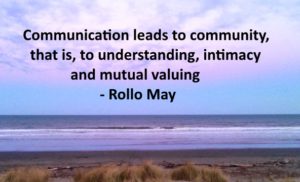Managing collaboration and engagement
 Ultimately, project success in collaborative initiatives depends on good communication, and an ethos of sharing. This involves project staff and key stakeholders jointly working towards agreed outcomes from the inception of the project, through to completion. Stakeholder analysis is a way to identify a project’s key stakeholders, assess their interests and needs, and clarify how these may affect the project’s viability. From this analysis, project managers can make plans for how these social and institutional aspects will be addressed. Reaching agreement on scope and scale of a project is always an important step, and requires the parties involved to clarify their framing of the problem in question. The process of conceptual modelling requires decisions to be taken regarding the scope and level of detail of the model. It also requires assumptions to be made about the situation concerned.
Ultimately, project success in collaborative initiatives depends on good communication, and an ethos of sharing. This involves project staff and key stakeholders jointly working towards agreed outcomes from the inception of the project, through to completion. Stakeholder analysis is a way to identify a project’s key stakeholders, assess their interests and needs, and clarify how these may affect the project’s viability. From this analysis, project managers can make plans for how these social and institutional aspects will be addressed. Reaching agreement on scope and scale of a project is always an important step, and requires the parties involved to clarify their framing of the problem in question. The process of conceptual modelling requires decisions to be taken regarding the scope and level of detail of the model. It also requires assumptions to be made about the situation concerned.
Over the past few years a number of reviewers have pointed to the need for us to get more accurate about our use of terms such as participation, public engagement and collaboration. Similarly we need to look not only at how well citizens and other stakeholders engage, but on the capacity that government and other agencies have to support the engagement of citizens and other stakeholder groups. There is growing evidence that we need to replace recipe-based approaches – which emphasize selecting the relevant tools for the job – with an approach that emphasizes participation as a process. This is in keeping with recent moves towards approaches based on partnership which promote risk communication and engagement as a two-way process in which both “expert” and “lay” perspectives should inform each other.
Following on from this is the growing importance of the concept of social licence to operate (SLO). This refers to the level of acceptance or approval by local communities and stakeholders of organisations and their operations. It does not refer to a formal agreement or document but to the real or current credibility, reliability, and acceptance of organisations and projects.The concept has evolved fairly recently from the broader and more established notions of “corporate social responsibility” and “social acceptability”. It is based on the idea that institutions and companies need not only regulatory permission but also “social permission” to conduct their business.
As the inter-linkages between our society and its environment become more apparent, so the notion of integration (across multiple social perspectives and fields of knowledge) becomes more important. Similarly we seek to back these up in science by moving beyond our more traditional disciplinary and multidisciplinary approaches, and exploring interdisciplinary and transdisciplinary approaches.